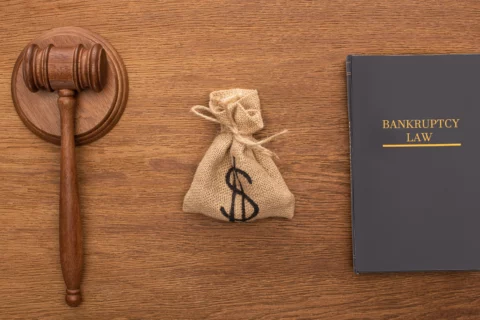A Guide on Bankruptcy Filing in Illinois
Are you facing a huge pile of debt but have no idea how to repay it? Overwhelming debt may cause you extreme stress, hardship, and pressure. When a person or a company struggles to repay debts to creditors, the last resort to solve financial problems is to file for bankruptcy.
Bankruptcy is defined as a legal process that is designed to help you eliminate a part or all of the total amount that you owe to a creditor. It can help you stay out of debt. However, not all types of debt can be wiped out in the bankruptcy process. Debts such as recent taxes, student loans, or child support are usually excluded. It will depend on the type of bankruptcy chapter that you will file.
Bankruptcy laws differ from state to state; therefore, it is essential to know and understand the state law to avoid any errors in filing bankruptcy.
Declaring bankruptcy can stop wage garnishment, debt lawsuits, and debt collection calls. With the help of a credible Aurora bankruptcy attorney, you will see an improvement in your finances within the first six months from the bankruptcy filing date.
The article covers the following important information that you need to know about bankruptcy filing:
- Types of Bankruptcy
- Reasons for Bankruptcy Filing
- Consequences of Bankruptcy Filing
- The Role of a Bankruptcy Lawyer
Types of Bankruptcy
 There are different types of bankruptcy that you can choose from depending on your financial status. The most common bankruptcy types are Chapter 7, Chapter 13, and Chapter 11. You have to select the most appropriate bankruptcy chapter that will help you achieve total debt repayment.
There are different types of bankruptcy that you can choose from depending on your financial status. The most common bankruptcy types are Chapter 7, Chapter 13, and Chapter 11. You have to select the most appropriate bankruptcy chapter that will help you achieve total debt repayment.
Chapter 7
The most common bankruptcy type is Chapter 7 bankruptcy. It involves the process of “liquidation” which means converting any property or an asset into cash by selling it. This is considered the fastest type of bankruptcy since most of the unsecured debts (credit card debt, personal loan, and medical debt) are considered as “forgiven”.
Qualifications
Before you qualify for this chapter, you need to meet the following criteria:
- You need to pass the “means test” (comparison of your family income to the median income).
- You should not have any Chapter 7 bankruptcy discharge for the past 8 years or any Chapter 13 bankruptcy discharge for the past 6 years.
- You should not have filed any bankruptcy petition for the past 180 days that was dismissed due to your failure to abide by the bankruptcy court orders, or dismissal of your bankruptcy filing.
Chapter 13
Chapter 13 bankruptcy, which is also known as the “wage earner” bankruptcy, allows you to restructure and reorganize your debts through a repayment plan that will last for 3 to 5 years. This chapter is best for you if you have assets and properties that you want to keep or a mortgage that you want to get current on.
Qualifications
Before you qualify for this chapter, you need to meet the following criteria:
- You need to have a regular monthly income.
- Your tax filings should be current and updated.
- You must not have filed a Chapter 7 bankruptcy for the past 4 years or a Chapter 13 bankruptcy for the past 2 years.
- You should not have filed any bankruptcy petition for the past 180 days that was dismissed due to your failure to abide by the bankruptcy court orders, or dismissal of your bankruptcy filing.
Chapter 11
Chapter 11 bankruptcy or the “reorganization” bankruptcy is usually used to keep a business operational. To qualify for this chapter, you should not have filed any bankruptcy petition for the past 180 days that was dismissed due to your failure to abide by the bankruptcy court orders, or dismissal of your bankruptcy filing.
Reasons for Bankruptcy Filing
Before you decide to file for bankruptcy, it is important to know how it will affect your credit and debt. A reliable Aurora bankruptcy lawyer can help you decide whether bankruptcy is the best way to solve your financial dilemma. A bankruptcy filing can be your best option for the following situations:
- Your debt (excluding mortgages) is 40% higher than your income.
- You try so hard to pay off your outstanding debts, but you still don’t make any progress.
- You cannot find other ways to pay back your debts within the next 5 years.
- Paying your debts prevents you from achieving other financial goals (such as retirement savings).
Consequences of Bankruptcy Filing
Bankruptcy comes with both advantages and disadvantages. As a bankrupt individual, you worry about the consequences that you might face once you file for bankruptcy. One of the common concerns is the after-effect of bankruptcy on your credit score.
Once you have filed for bankruptcy, it will stay on your credit history for a maximum period of 10 years and it can damage your credit score. However, the effect of bankruptcy in your credit report will gradually fade with time as you think of ways on how to improve your credit score after bankruptcy. Rebuilding credit requires a lot of effort, hard work, and effective debt management skills.
The Role of a Bankruptcy Lawyer
According to the Federal Judicial Center, only 1.4% of the Chapter 13 bankruptcy petitions filed without a lawyer in 2012 were closed, discharged, and the qualifying debts were forgiven. On the other hand, 95% of Chapter 7 bankruptcy cases filed with a lawyer in 2012 have been successfully resolved, compared to the 5% of cases filed without a lawyer.
Bankruptcy filing is a complicated process. It requires you to prepare the complete documents for your paperwork. You need to accurately fill out the necessary bankruptcy forms. You are obliged to disclose all your personal and financial information including your assets, liabilities, bank account details, monthly income, living expenses, credit card debts, loan debts, and property transactions.
For legal help in filing for bankruptcy, do not hesitate to consult our competent Aurora bankruptcy attorneys at Cutler Bankruptcy. Our lawyers will guide you throughout the whole bankruptcy filing process, help you have a fresh start, and achieve a debt-free life.


